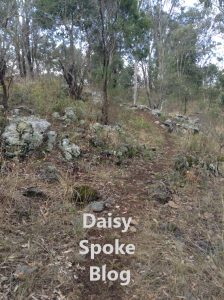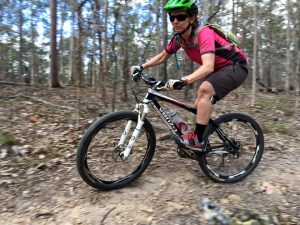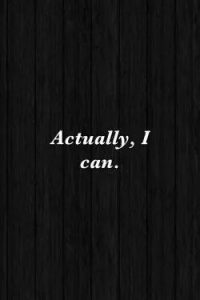
In a world that expects us to be efficient, effective and resourceful, we risk letting go of those things that sustain our energy, health and creativity. One of these things is time spent in nature. Here are 8 reasons why time spent in nature is never a waste of time.
1. Nature is a sanctuary from the pressures of modern life
We live in a world that expects us to deliver outcomes and meet deadlines. We have constant pressure to be productive and to not waste time, energy or resources. Many people feel increasingly stretched and strung out with our outcomes-based society. Nature provides a sanctuary from the pressures of modern life. When we step outdoors into the forests, mountains, deserts, beaches and waterways, we immerse ourselves in a bigger world. We are at play, not at work.
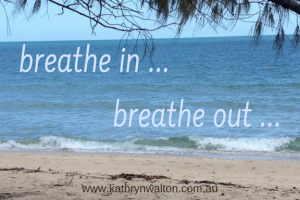
2. Nature gives your brain a break
Brains are like busy factories mass producing thoughts, decisions, predictions, reflections, assessments, judgements, assumptions and beliefs all whilst keeping our hearts beating and our lungs breathing. There’s a lot going on inside our heads whether we realise it or not. Getting outside into some green space gives your brain a much needed break from the type of thinking it does all day. Nature is a trigger for your brain to switch modes and operate on a different level – a bit like a mini holiday!
3. Nature restores and re-energises
When we’re busy we tend to cut back on things that seem less important or urgent at the time. Usually this means we cut ourselves short on self-care. We run ourselves into the ground working harder and faster whilst putting less priority on how we are going to sustain the pace. Half an hour outdoors can be enough time for your mind to begin to reset and for your body to feel re-energised. It’s an investment you can’t afford to miss.
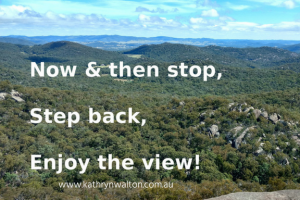
4. Nature refocuses your attention
Modern life runs at a pace requiring us to be thinking and doing multiple things at once. Research shows this isn’t necessarily the most efficient (or joyful) way of living. When we focus on one thing at a time, we tend to operate more efficiently and effectively. Although it might feel slower because you’re used to being in the fast lane, it’s actually more productive in many situations! Regular time in nature can teach you to bring your attention to your immediate surroundings. This helps you to let go of your stresses, gently engage all your senses, and refocus your attention when you’re back in your everyday routine.
5. Nature shows you how to slow down
Do you find yourself reacting to a pressured lifestyle by working even harder, hoping that when you get to the bottom of your ‘to do’ list you’ll be able to relax? Sorry folks that isn’t a strategy that is sustainable over the long-term unless you give yourself regular breaks to slow down and switch off. Your ‘to-do’ list will never go away. There will always be something else that demands your attention. When you prioritise time in nature, you learn to slow down – in a good way. Your brain has a much needed rest and you come back to your ‘to-do’ list with a fresh perspective and new energy.
6. Nature stimulates creativity and innovation
You don’t have to be an artist to appreciate the special gifts that nature has on offer. Any one of us can savour the creativity and innovation that often comes with time spent in nature. Perhaps it’s associated with the opportunity to slow down and refocus, I don’t know for sure. But what I do know is that some of my best and most successful ideas have come to me when I’ve been out walking or riding.
7. Nature gets you active
A major contributing factor to chronic disease, including depression, is inactivity. Nature is the natural antidote to a sedentary lifestyle. With so much space to stretch out and explore, so many wonders to be discovered, so much fresh air to breathe and trees to hug (well, maybe that’s just me), what more incentive do you need to get out and get active.
8. Nature improves efficiency and effectiveness
Have you ever gone in search of the perfect time management technique, tool or app hoping to be rescued from the stress of managing multiple roles and responsibilities? Despite the numerous time management tools available to us, time management is actually all about managing YOURSELF, not time. If you really want to improve efficiency and effectiveness, invest part of your day, everyday, outside in nature. If you’ve read all the other reasons why time spent in nature is not a waste, then it will be obvious to you that it’s one of the best investments you can make to improve your effectiveness and efficiency at work, home and in your relationships with other people.
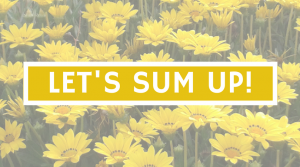
Time spent in nature is NEVER a waste! Oh let me count the ways ….. (well, at least 8 of them anyway!)
1. Nature is a sanctuary from the pressures of modern life
2. Nature gives your brain a break
3. Nature restores and re-energises
4. Nature refocuses your attention
5. Nature shows you how to slow down
6. Nature stimulates creativity and innovation
7. Nature gets you active
8. Nature improves efficiency and effectiveness
You can listen to this article on the Outdoors is my Therapy podcast!
Discovering mountain biking as life’s ultimate parallel universe in her middle age,  Kathryn Walton shares information and reflections in Daisy Spoke that connect, inspire and self-empower women to make healthy choices for themselves. She integrates her love of physical exercise, family, nature, gardening and creative arts with her professional background in mental health social work to facilitate change with individuals, groups and communities of women who are committed to living life to the full.
Kathryn Walton shares information and reflections in Daisy Spoke that connect, inspire and self-empower women to make healthy choices for themselves. She integrates her love of physical exercise, family, nature, gardening and creative arts with her professional background in mental health social work to facilitate change with individuals, groups and communities of women who are committed to living life to the full.
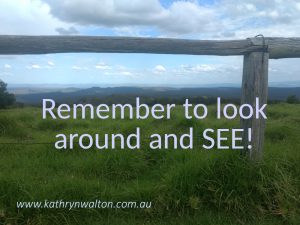
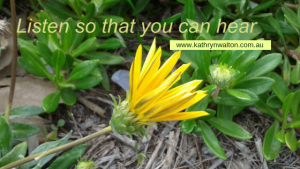

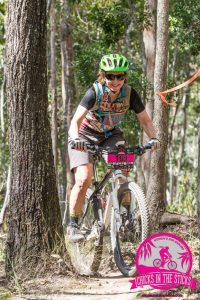
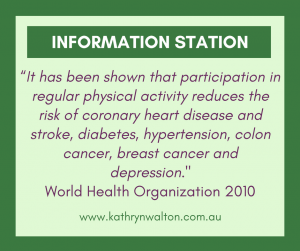

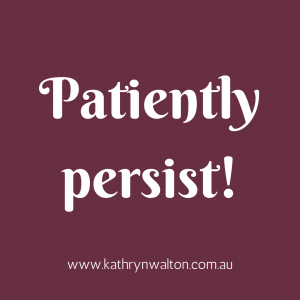
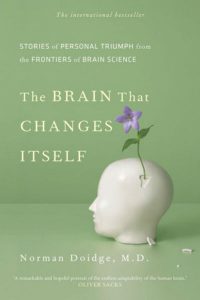

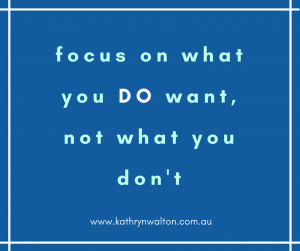

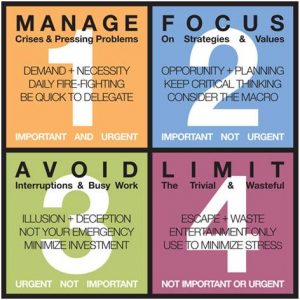

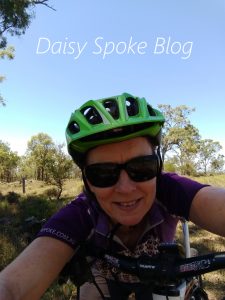 Daily exercise and general physical activity are crucial elements of feeling good. Just as some people might need to diligently take medication every day, I need to exercise every day. Exercise is nature’s way of stimulating the hormones which aid concentration, problem-solving, sleep, digestion, and mood. This daily dose of exercise rebalances our body’s systems resulting in wide-ranging benefits that no single medication can provide. The research is absolutely clear that regular medium to high intensity exercise can have a profound effect on health AND happiness.
Daily exercise and general physical activity are crucial elements of feeling good. Just as some people might need to diligently take medication every day, I need to exercise every day. Exercise is nature’s way of stimulating the hormones which aid concentration, problem-solving, sleep, digestion, and mood. This daily dose of exercise rebalances our body’s systems resulting in wide-ranging benefits that no single medication can provide. The research is absolutely clear that regular medium to high intensity exercise can have a profound effect on health AND happiness.
 Minds are such complex things! They wield a lot of power over our emotions and our actions (including sleep). But unless you notice what’s going on in your mind, and choose how much power to give it, your thoughts, assumptions and beliefs will control you instead of the other way around. The habit of being hooked by thoughts or strongly attached to them is limiting and anxiety-provoking. The key here is to begin by simply noticing what is happening in your mind, and by doing this with curiosity and without judgement. The power is in the noticing. You’ll collect all sorts of interesting bits of information about how your mind works, what thinking patterns it gets locked into, what beliefs and assumptions are behind it all, and how all of this impacts your physiology, your behaviours and your emotions. One of my favourite sayings is “Don’t believe everything you think!” because we can learn to stand back, notice the thought and choose whether to believe it, or not.
Minds are such complex things! They wield a lot of power over our emotions and our actions (including sleep). But unless you notice what’s going on in your mind, and choose how much power to give it, your thoughts, assumptions and beliefs will control you instead of the other way around. The habit of being hooked by thoughts or strongly attached to them is limiting and anxiety-provoking. The key here is to begin by simply noticing what is happening in your mind, and by doing this with curiosity and without judgement. The power is in the noticing. You’ll collect all sorts of interesting bits of information about how your mind works, what thinking patterns it gets locked into, what beliefs and assumptions are behind it all, and how all of this impacts your physiology, your behaviours and your emotions. One of my favourite sayings is “Don’t believe everything you think!” because we can learn to stand back, notice the thought and choose whether to believe it, or not.
